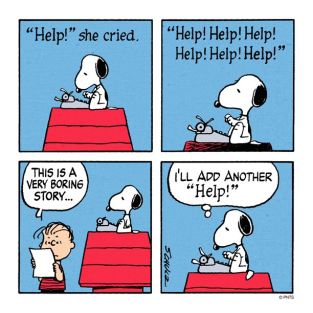 It’s the beginning and more specifically the first sentence, then paragraph, then page, then chapter. You have to grab your reader the minute they pick up your novel.
It’s the beginning and more specifically the first sentence, then paragraph, then page, then chapter. You have to grab your reader the minute they pick up your novel.
When you are ready to submit your work to an agent, one thing you will notice is they don’t want your complete work. They only want the first few pages, or some may ask for a couple of chapters. Don’t be bold and overconfident sending them the entire thing.
They probably will toss it to the side for your failure to follow instructions. If they do read, they won’t get very far if the first few pages aren’t compelling enough to draw them in (which was the part they wanted to see in the first place).
Agents as a rule, don’t want to see the entire manuscript until they know you can write a compelling story. You have to make them want to see more. Leave them hanging on the edge of their seat. They will ask for the rest of your manuscript just to find out what happens next.
That’s the same thing that will happen for your readers. You want to do an e-book and bypass the literary agent, that’s fine too, but your readers will do the same thing the agent does. They will read a sample prior to buying the book. It had better be compelling from the beginning or you lost a sale. Remember you’re asking people to invest time and money when they purchase your work. Make it worthy of their interest.
Look at your first chapter as a promise to your readers. Remember your first pages set the tone and ground rules for how you will tell your story. No matter how polished your manuscript is, how compelling your characters are, how tightly you’ve plotted the story, that first chapter has to draw the reader in or they will never know.
-Jan R
Reblogged this on Felicia Denise, Author and commented:
Does your first chapter make a promise to readers? Do you live up to it? #WritersIssues
LikeLiked by 1 person
Thank You! And thanks for stopping by 🙂
LikeLiked by 1 person
You’re welcome, and thank you! I admire your blog! 😉
LikeLiked by 1 person
That forst ‘everything’ is the hardest thing to write. I should know, I’ve rewritten my first chapter some 20 times and my first page some 30. Though I should say, after a couple revisions, I realised I had make a decision on the first draft that really harmed the opening and it was even harder to fix it.
Am I obsessed? I don’t know.
I thought that from chapter 3 the story smoothed out quite nicely… I aslo know I can’t have the reader wait until chapter 3.
LikeLike
I can relate. I have a two chapter set up that I’ve tried to make interesting but am questioning if I should jump to the action and add the front as backstory. Sometimes we are too close to the story. I’m having someone read mine to see what they think. From my perspective the backstory is necessary to follow what’s happening, but I’m not sure if it will keep my reader’s attention. Good Luck 🙂
LikeLike
I actually did that first thing. My chapter 3 finally became my chapter 1 and I never regretted it. I actually don’t even remember how it was before I made the switch.
I’d say that normally WE think the reader needs the beckstory beforehand, but the truth is they don’t. If the action is clear enough, reader are happy to discover things later. I certainly am as reader 😉
LikeLiked by 1 person
The first chapter of my novel is only about 670 words long, but I have to polish it into the best 670 words I can write if I want anyone to read the succeeding chapters. I can tell if I’m going to like a book or not from the first page.
LikeLiked by 1 person
I agree 🙂 Thanks for stopping by!
LikeLike
You have made a very good point here.
LikeLiked by 1 person
Thank you! And thanks for stopping by 🙂
LikeLiked by 1 person
I lean toward the view that no part of the story is more important than the other. Middles can kill novels. It’s easy to see the set-up that propels the novel, and usually easy to see the climax, but quite often middle acts sag and so does reader interest. Any element of your novel that causes readers to put the book down and never return hurts your career.
If an agent asks for your novel based on the front punch, and you can’t deliver the knockout when you send the manuscript, the agent has you tagged. Great promise, no delivery.
Is that first line, first paragraph, first page triad critical? Absolutely. And you should polish, polish, polish. But you must deliver on that hook. All the way to the last page, last paragraph, and last sentence.
LikeLiked by 1 person
I agree completely, but you have to get your foot in the door 🙂 Thanks for stopping by.
LikeLike
Reblogged this on authorkdrose.
LikeLiked by 1 person
Reblogged this on Chris The Story Reading Ape's Blog.
LikeLiked by 1 person
That opening part is the clincher. I like the meme. Made me laugh out loud.
LikeLiked by 1 person
[…] via What’s the Most Important Part of Your Novel? — Writing your first novel-Things you should know […]
LikeLike
So true. You have to answer the question “Why should I read this?” with your first sentence.
LikeLiked by 1 person